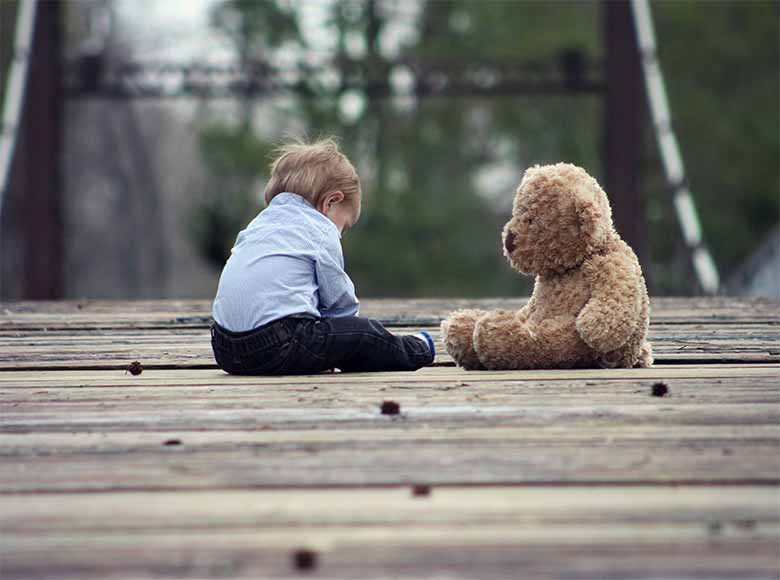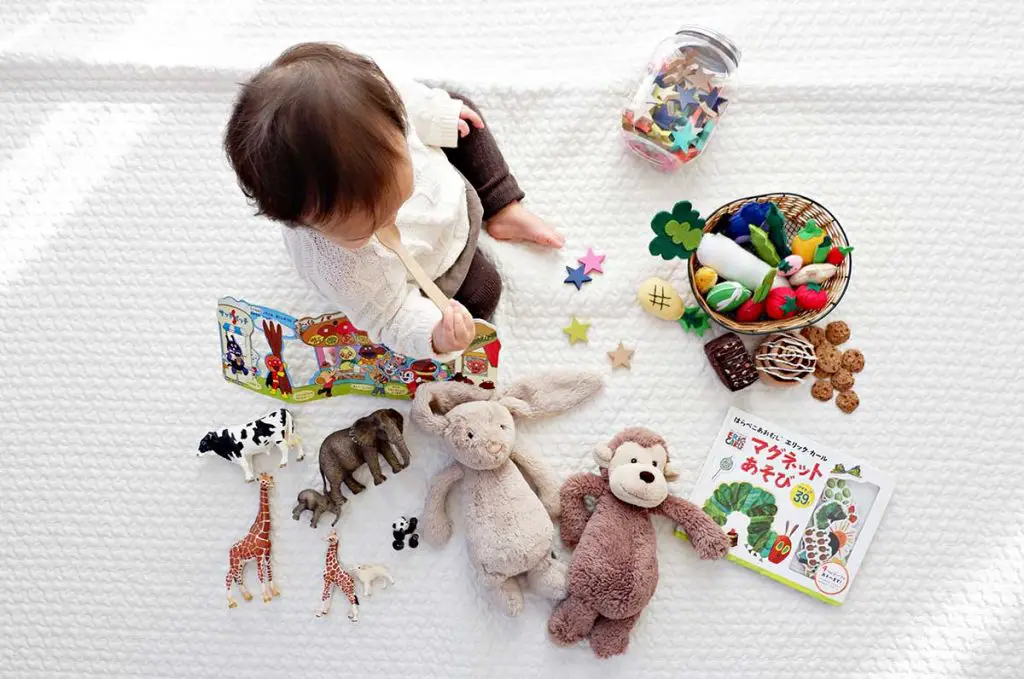It’s not unusual for babies to be scared or fearful. From kitchen appliances making noises to strangers fixing the toilet, and monsters under the bed, infants can find the world a frightening place! And, a baby scared of toy objects is not as unusual as you might think.
Having an awareness of their surroundings is part of a child’s development and your role as a parent is to reassure them while building their confidence. Read on to find out how to help your baby overcome his or her fear of toys.
Why Babies Can Become Scared of Toys
Experiencing fear is a natural part of childhood development. Babies develop a fear of loud noises, different objects, and strangers. From one year old, babies may become fearful of creatures, the dark, imaginary monsters, and their toys especially if they make loud sounds or have scary faces.
Being afraid is part of growing up and childhood fears are normal. Babies intuitively respond to different facial expressions such as a happy or sad face within hours of being born. From five months old, a small baby is able to distinguish between emotional expressions such as fear or anger. From seven months old, babies can attach meaning to these expressions. By your baby’s first birthday, they’re able to associate a fearful expression with danger.
While childhood fears are essential for your child’s healthy development, they need to be managed appropriately to help your little one cope better. Understanding why your baby is scared of a toy will help you, as a caring parent, to give your baby the skills they need to be less fearful of their toys.
New Toy is Introduced
Being aware of your own facial expressions as a parent is key to helping your child navigate their own fears. When a new toy is introduced to your baby and you, for some reason, show anger or fear towards this object, your baby will pick up on this as a sign something is wrong. Your child will reject the new toy, e.g. the latest cause-and-effect toy, choosing not to touch or play with it.
This often happens when someone you dislike offers your baby a new toy. While you may politely accept the toy, your facial expression may be telling a different story to your baby!
Baby Suddenly Getting Scared of Toys (Whereas Before He Was Not Afraid)
The older your baby gets, the more aware they become of the world around them. Toddlers develop a need to be independent and strive to take control of everything. However, increased awareness of the world can also heighten certain fears including suddenly getting scared of toys.
What was once your baby’s favorite big alligator now becomes a scary monster with big teeth and evil eyes. When your baby reaches toddlerhood, they’re dealing with a lot of change resulting in feeling fearful of objects, noises, and the alligator that resembles the scary monster under the bed.
How to Calm Scared Baby
Calming a suddenly fearful toddler or scared baby needs to be done without making your child feel silly about their fears. Show your scared baby you understand their fears and comfort them while trying to identify what they’re really afraid of. It’s also essential to figure out if there are certain stressors or changes that have triggered fear in your growing child.
Calm a scared baby by telling them that they’re safe and that they can trust you to protect them. It’s absolutely essential you don’t start to panic as this will only make your baby more fearful. Remember, they can interpret your own fears simply by looking at your facial expressions so make an effort to show a calm, relaxed expression.
Depending on the age of your baby, you can minimize your infant’s fears by:
- Managing TV time: Manage the amount of time your little ones watch TV and ensure the programs aren’t violent or disturbing.
- Looking out for scary images: Be mindful of commercials, books, or other mediums that use images of scary creatures.
- Controlling holiday activities: Help your young child from getting too overwhelmed on holidays such as Halloween or Christmas when people dress up in scary outfits which could frighten your baby or toddler.
While it’s vital to calm a scared baby, it’s essential to realize their response is a natural part of growing up. This way, you can give them the support they need while helping them overcome their fears.
Baby Scared of Certain Toys
It’s not unusual for your baby to be scared of certain toys. While most babies love stuffed animals, the lion with the big, scary face may suddenly seem like a monster to some children. Toys with clown faces may also scare babies while moving toys could seem terrifying to others.
Talking toys can also be frightening for babies especially when they don’t recognize the voice as someone they know and feel safe with. These toys can suddenly become real-like strangers to babies and toddlers. Large and noisy toys such as bounce houses for kids may be intimidating for young toddlers especially if they’re overwhelmed by too much activity.
Watch this video as Lukas Ritson talks about using playgrounds as a place for children to develop resilience in a fear-based world.
Baby Scared of Moving Toys
By the time your baby is one to two years old, they’re fully aware of bugs and any other object that moves around. For some babies, these objects are not something to be afraid of. However, at this stage, they’re also learning to associate fear with danger and some babies may suddenly find anything that moves scary!
Moving playthings such as ride-on toys for 1-year-olds can trigger the same response, with older babies associating these active objects as being something dangerous. Your role as a parent is to help your baby navigate this fear of moving toys by teaching them how to respond appropriately.
This can be done by modeling your own confident response to any moving object including bugs and toys. This way, you’re setting a healthy example for your baby to follow.
Baby Scared of Talking Toys
One can’t help but see the array of chatty, electronic toys available for children of all ages. And, while these toys seem cute and alive, they can be scary for babies. Talking toys often have robotic voices that may confuse your baby and frighten them. And, any toy that makes sudden sounds such as cackling or outbursts of laughter will sound terrifying for an infant who is over a year old and suddenly fearful of loud noises.
Small and older babies can’t distinguish between reality and imagination, and a talking toy may seem like a scary stranger who’s out to get them! Very small babies of four or five months old, they’re not able to separate objects from sound and suddenly hearing a voice or noise can cause them to be startled.
Baby Scared of Stuffed Animals

It’s very common for preschoolers to suddenly develop a fear of stuffed animals. It’s at this stage of their development that your child’s imagination starts to really kick in. And, if your older baby has a scary thought while holding his favorite stuffed toy monkey, he may blame Congo for those thoughts.
It’s the same for a toddler who wakes up from a nightmare and finds herself staring into the face of her cuddly toy cow. By associating Moo with her nightmare, she’ll become fearful of it and decide to hide him away in the cupboard, out of her sight.
Your child’s favorite soft toys, whether it’s a hamster toy or a plush Elmo toy can suddenly turn into monsters for them as their levels of fear develop. The key here is to help your preschooler to navigate their fears around their soft toy. Don’t force them to still love Moo or Congo but rather let them decide when they feel safe again with their stuffed animal toy.
Having some cute stuffed animal names for your child’s soft toys may also help them to accept plushies without being fearful of them.
Conclusion
Being aware of your baby’s natural development of fear helps you to understand why your infant won’t take grandma’s new toy or suddenly finds their favorite plushie a threat. With this understanding, you can help your baby overcome their fear in a healthy and confident manner.
And has it ever happened to you yet that your child is suddenly afraid of the vacuum cleaner? That’s another article I wrote recently.
